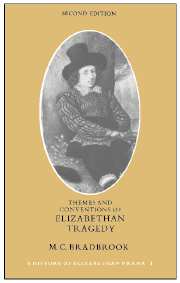Book contents
5 - CONVENTIONS OF SPEECH
Published online by Cambridge University Press: 08 January 2010
Summary
The habits of reading and of writing which have been discussed in the previous chapter produced a very different attitude towards dramatic speech from that of the present day. The Elizabethan drama was frankly rhetorical; that is generally admitted. It was because so many of the speeches were based upon public property of one kind or another — common tags or common situations — that this rhetorical speech became possible. It is manifested in two ways: by variations in the level of the speech, and by variations in its direction. I shall discuss first the formal ordering of the speech (that is, its pattern), and then the direction of the speech, or its relevance to the character speaking and the character spoken to.
Modern drama is usually written entirely upon one speech level; that is, the play is wholly in prose or wholly in verse, the language is uniformly close to or removed from the language of real life, and the characters either address each other directly, or, as in the asides of expressionist plays, speak their thoughts aloud.
The Elizabethan drama is not consistent in this respect. The variation of pattern between prose and blank verse is not the only one; the verse may be formalised into couplet, stanza or lyric interlude.
- Type
- Chapter
- Information
- Themes and Conventions of Elizabethan Tragedy , pp. 90 - 128Publisher: Cambridge University PressPrint publication year: 1980

